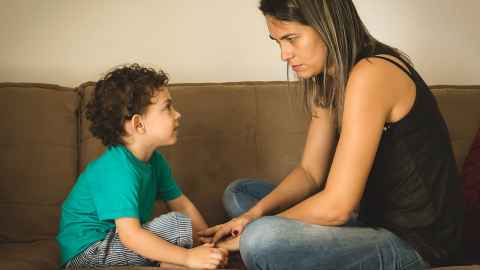Talking terrorism with children
19 March 2019
Opinion: We can't shelter children from the news so how do we help them cope with a terror event so close to home. Associate Professor Carol Mutch gives advice.

As the country comes to terms with the unimaginable atrocity committed in Christchurch against Muslims practising their religion in what should have been a safe and hallowed place, we are left with many questions.
One question is how to help children process the events they have witnessed, viewed or overheard.
It is important, first of all, that the adults in the child’s life have thought about the messages they are giving by their responses. If adults can stay calm and measured, children will take their cues that this is how to respond.
Having said that, it is appropriate to show your own response in a manner that works for you—through tears, hugs, talking to friends and family, prayers, music, finding a creative outlet or doing something practical to help. Explain to your children why you are feeling this way and what you are doing to help yourself move through this stage.
Try to keep your viewing of events on media and social media to a minimum while children are around. Model to your children that one way of coping is to think about others – what can you do to support or help someone else?
It is hard to give hard and fast advice about how to help children because, as with adults, they might all respond differently – even within one family. However, here is some advice that works for most situations that you can adapt if you need to:
- Acknowledge that the event did happen. Don’t cover it up, but give out only as much information as is appropriate to the child’s level of curiosity and understanding. Your account should be accurate but doesn’t need to include distressing or unnecessary information.
- In the case of the Christchurch mosque killings, remind them calmly that the event is now over. Don’t say it will never happen again but say that we can learn from what happened here and try to prevent it happening again.
- Focus on some of the good things that happened – the quick response of the police, that the man who did these bad deeds has been caught, and how people have come out to help each other and show support for those affected.
- Remind them that in a future event, there are many people who will help. In Christchurch, the police came to help stop the attacks, the ambulance drivers took the injured to hospital, people nearby stopped to comfort those who were upset, and teachers in schools looked after children until it was safe to go home.
- Watch how your child reacts – it may change from day to day and over time. One child might be very emotional and then move on – another might be very quiet but then display unusual behaviour at a later date.
- Regular routines are helpful. While you might relax routines, such as bedtimes, when children are highly distressed, try to re-introduce those routines as soon as possible. Make good use of favourite toys, stories or activities to help children feel settled. When children are back at school, teachers will be doing the same. They will find a balance between enabling children to talk about the events and providing safety and security through regular routines.
- Keep children away from television news and social media. Research from the US found that some children who repeatedly watched the 9/11 planes crashing into buildings ended up with a form of post-traumatic stress disorder.
- Expressing creativity through art and craft activities, singing, playing and listening to music, poetry and story writing, drama, dance, play and physical expression are all ways in which children can immerse themselves to process their feelings safely. Don’t force children to discuss the events. Often the conversations they have and questions they ask while they are finger painting or making a card can be very valuable because you get an insight into what they are thinking without re-traumatising them.
- It is important that children do not keep revisiting the matters they find distressing. Try to distract them with other activities, favourite toys, happy conversations or an occasional treat. Remember that getting them to help others is an activity that takes them out of themselves and is helpful for their recovery.
- If your child has been strongly affected they might exhibit behaviours unusual for them – clinginess, bedwetting, withdrawal or anger. Keep calm and monitor these behaviours using the strategies suggested above. If these behaviours continue for a prolonged period or start to impact on school or home life, it might be time to seek help. Start with your GP or your school. They can refer you on from there.
- If your child has had an earlier traumatic event in their life, new events can trigger a relapse. Just keep an eye on how they react to the new event and seek help if necessary.
A traumatic event, such as the Christchurch mosque killings, can be distressing for those involved, and those at a distance. It is a time for telling your family that you love them and that you are there for each other. It is also a time to have a plan for unexpected events. A practical task could be to update communication details, emergency kits and evacuation plans. Having a plan lessens anxiety and practising it gives a sense of control as well as a useful rehearsal in case of an emergency.
Associate Professor Carol Mutch is from the University of Auckland’s Faculty of Education and Social Work. This article reflects the opinion of the author and not necessarily the views of the University of Auckland.
Used with permission from Newsroom Talking terrorism with children published on 19 March 2019.